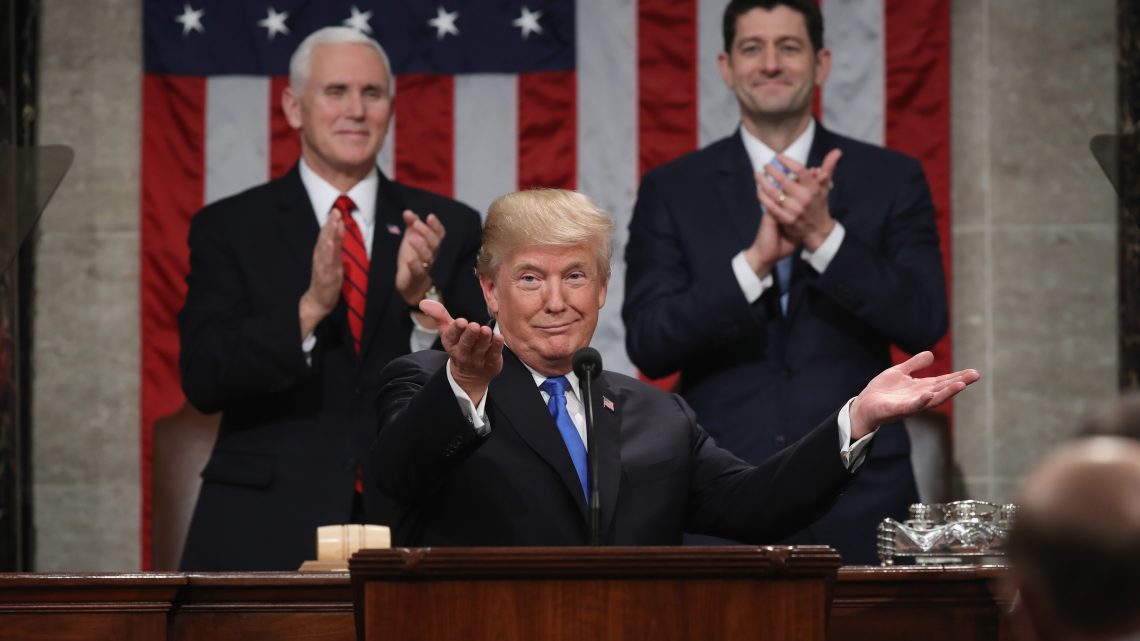
The State of the Union Is Pointless, Dull, and Needs to End
February 4, 2019One of the defining features of the Trump administration is that the public can't trust what the president says. Chalk this up to Donald Trump being a world-class bullshitter, or his lack of knowledge about nearly everything he talks about, or the idea that we're supposed to take him "seriously but not literally"—the effect is the same, which is that he constantly says things that are untrue. These untruths aren't confined to Trump's casual remarks, where you might forgive a certain amount of flubs; he's misrepresented terrorism statistics in an address to Congress and repeated misleading campaign lines while speaking at the United Nations. Nor are the false statements just a byproduct of Trump's personal dishonesty; his press secretaries have told fibs on his behalf as well.
We'll be confronted by that legacy of falsehoods once more on Tuesday, when Trump is scheduled to give the annual State of the Union speech, which was delayed by House Speaker Nancy Pelosi during the government shutdown. If it had been canceled completely, few would have missed it. In the past several years it has been condemned by pundits on the right and the left for being stale, overly ceremonial, and pointless. The speeches, which tend to cover a huge array of policies, are rarely ever memorable and made much too long thanks to incessant applause breaks. The tradition of the president and members of Congress bringing guests to demonstrate one political point or another is similarly tired, even if the thought behind those guests is often well-intentioned. Even the pieces about how bad the State of the Union is are a matter of routine at this point. It's a piece of political theater that isn't even entertaining. The memorable State of the Union addresses are largely memorable because they occurred at times of great upheaval, not because the speeches were any good.
As has been noted before by anti-SOTU pundits, there's no practical or legal reason for the speech to exist. Though the Constitution mandates that the president "shall from time to time give to the Congress information of the State of the Union, and recommend to their Consideration such measures as he shall judge necessary and expedient," for most of American history that meant a written message, not a speech. And though the State of the Union can be an opportunity to announce major initiatives, it's not as if the president lacks channels to make those sorts of announcements—Trump can and does take to Twitter anytime he wants and launch into existence any policy that is on his mind.
According to Politico, Trump will use the speech to make a big promise: He wants to end all HIV transmissions in the US by 2030. He's also going to call for bipartisanship and cooperation on a number of other issues. Both of those sound like fine ideas, but it's hard to have much faith that Trump will put much muscle behind either of those pledges. How is anyone supposed to take them seriously, at this point? He has presided over an increasingly partisan climate in DC—a trend not started by Trump—and while the war against HIV is about as uncontroversial an issue as you can find, it's hard to forget that the slate of promises Trump made in last year's address have gone largely unfulfilled.
The State of the Union was dreary and superfluous before Trump and will be dreary and superfluous after he's gone. When it's Trump delivering the speech, however, there's an added layer of pointlessness to the affair, as the country has no reason to believe either his diagnosis of the problems faced by the country or that he'll follow through on any of his proposed cures. It'll be a dull speech, quickly fact-checked and quickly forgotten. We don't need Trump to tell us what direction the country is going in.
Sign up for our newsletter to get the best of VICE delivered to your inbox daily.
Follow Harry Cheadle on Twitter.


